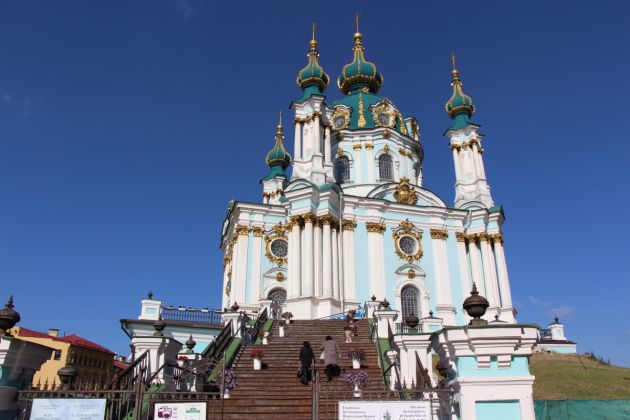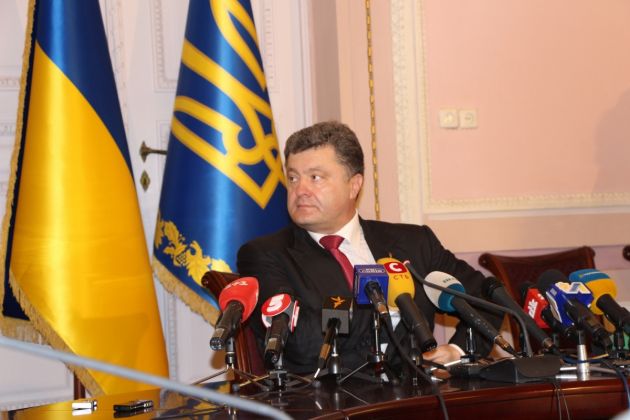Ukraine Orthodox bishops create independent church; Moscow Patriarchate rails against 'State interference'

A council of Orthodox bishops has created a new Ukrainian church, marking an historic split from the Russia patriarchate which its leaders said is vital to the country's security and independence, fueling a split in Christian Orthodoxy.
The new church has caused a major rift in Orthodox Christianity between the Istanbul based Ecumenical Patriarchate of Constantinople and the Moscow Patriarchate of the Russian Orthodox Church.
The announcement on Dec. 15 came after Ukrainian priests held a synod in the capital Kiev's 11th-century Saint Sophia Cathedral to establish an Orthodox church independent from Moscow, Al Jazeera reported.
Ukrainian President Petro Poroshenko announced that 39-year-old Metropolitan Epifaniy of the Kiev Patriarchate church is the head of the new church. His secular name is Sergiy Dumenko.
"I would like to call on all our brothers, bishops and all believers to the newly created united Ukrainian Orthodox Church," Yepifaniy told the crowd outside the cathedral.
"The doors of our church are open to all."
Poroshenko said thousands of people, "This day will go down in history as a sacred day ... the day of the final independence from Russia."
The crowd shouted "Glory! Glory! Glory!"
Patriarch Kirill of the Moscow Patriarchate sent letters to religious leaders, senior statesmen and heads of international organizations accusing the Ukrainian authorities of exerting pressure on the Ukrainian Orthodox Church.
He said the government had interfered in the ecclesiastical life in Ukraine
"Recently, the interference of the leaders of the secular Ukrainian state in church affairs has grown into a blatant pressure on the episcopate and clerics of the Ukrainian Orthodox Church, what allows us to speak of the beginning of the large-scale persecutions," the letter reads.
TRAVELING TO ISTANBUL
Poroshenko said he would travel with Epifaniy to Istanbul in January to receive an official Tomos from the head of global Orthodoxy granting the new church independence.
The Ukrainian president made the creation of a new church a key campaign issue before elections next year, and told the bishops that the State "did everything it could" towards the creation of the church.
"Ukraine was not, is not, and will not be the canonical territory of the Russian church," Poroshenko said, adding that an independent Ukrainian Orthodox Church was now a "matter of national security."
Ukrainian authorities have alluded to Russian Orthodox priests in Ukraine as supporting Russian-backed separatists in eastern Ukraine, claims that the clerics have rejected.
Ties between Russia and Ukraine have broken down since Moscow annexed Crimea in 2014 following an uprising in Kiev that ousted a pro-Moscow leader and Russia-backed separatists seized a big swathe of territory in eastern Ukraine.
The synod came shortly after a maritime crisis that saw Russia seize three Ukrainian navy ships and arrest 24 sailors in the waters around Crimea.
The Ukrainian Orthodox Church has been under the Moscow Patriarchate for centuries.
But church tensions emerged after Ukraine became independent in 1991, when the Soviet Union collapsed, the BBC reported.
Before the council in Kiev, there were three Orthodox Church branches in Ukraine:
* The Ukrainian Orthodox Church (Kiev Patriarchate)
* The Ukrainian Orthodox Church (Moscow Patriarchate)
* The Ukrainian Autocephalous Orthodox Church
Now, priests from the Kiev Patriarchate and the Autocephalous Church become members of the new church - the Orthodox Church of Ukraine.
The drive for Ukrainian Orthodox independence intensified in 2014, when Russia annexed Crimea and Russia-backed separatists seized a big swathe of territory in eastern Ukraine.
In September, the Russian Orthodox Church said it had effectively cut diplomatic relations with the Ecumenical Patriarchate of Constantinople, which has authority over some 300 million Orthodox Christians.
It followed signs that Ecumenical Patriarch Bartholomew will recognize Ukraine's Church as independent from the Moscow Patriarchate under the leadership of Patriarch Kirill, formerly Archbishop of Smolensk and Kaliningrad.
Ahead of the expected decision, Bartholomew sent two representatives to Ukraine this month, evoking the ire of the Russian patriarchate.
